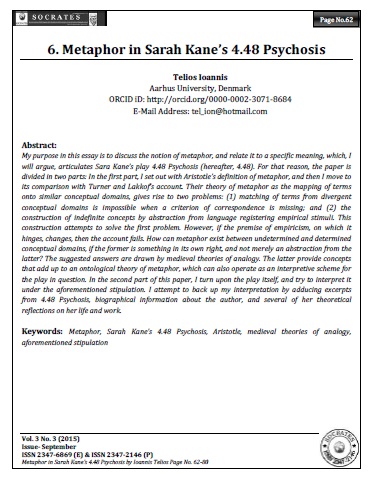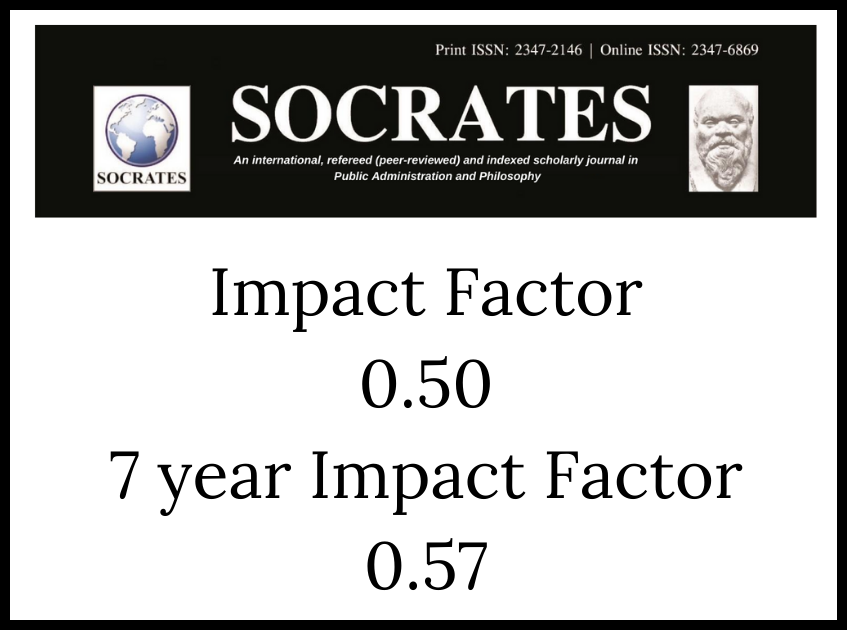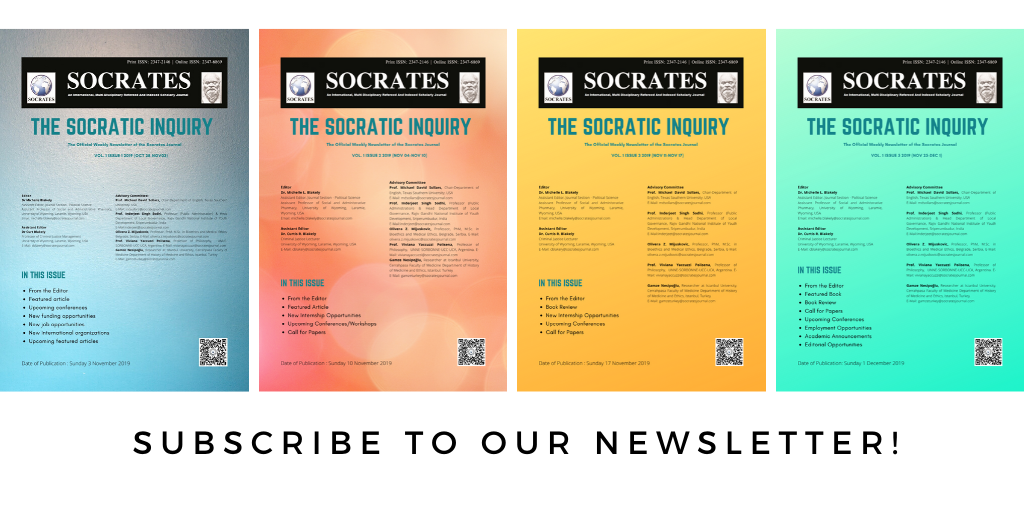Metaphor in Sarah Kane’s 4.48 Psychosis
Keywords:
Metaphor, Sarah Kane’s 4.48 Psychosis, Aristotle, medieval theories of analogy, aforementioned stipulationAbstract
My purpose in this essay is to discuss the notion of metaphor, and relate it to a specific meaning, which, I will argue, articulates Sara Kane’s play 4.48 Psychosis (hereafter, 4.48). For that reason, the paper is divided in two parts: In the first part, I set out with Aristotle’s definition of metaphor, and then I move to its comparison with Turner and Lakkof’s account. Their theory of metaphor as the mapping of terms onto similar conceptual domains, gives rise to two problems: (1) matching of terms from divergent conceptual domains is impossible when a criterion of correspondence is missing; and (2) the construction of indefinite concepts by abstraction from language registering empirical stimuli. This construction attempts to solve the first problem. However, if the premise of empiricism, on which it hinges, changes, then the account fails. How can metaphor exist between undetermined and determined conceptual domains, if the former is something in its own right, and not merely an abstraction from the latter? The suggested answers are drawn by medieval theories of analogy. The latter provide concepts that add up to an ontological theory of metaphor, which can also operate as an interpretive scheme for the play in question. In the second part of this paper, I turn upon the play itself, and try to interpret it under the aforementioned stipulation. I attempt to back up my interpretation by adducing excerpts from 4.48 Psychosis, biographical information about the author, and several of her theoretical reflections on her life and work.
Downloads
Metrics
References
Aristotle (1932). Poetics. Aristotle in 23 Volumes (Vol. 23) (W. H. Fyfe Trans.). London: Harvard University Press.
Ashworth, E. J. (Fall 2009 Edition). Medieval theories of analogy, The Stanford Encyclopedia of Philosophy. E. N. Zalta (Ed.), <http://plato.stanford.edu/archives/fall2009/entries/analogy-medieval/>.
Barnett, D. (2008). When is a play not a drama? Two examples of postdramatic theatre texts, New Theatre Quarterly, 24, 14-23.
Bortolussi, M. & Dixon, P. (2003). Psychonarratology. Foundations for the empirical study of literary response. Cambridge: Cambridge University Press.
Campbell, A. (2005). Experiencing Kane: an affective analysis of Sarah Kane’s “experiential” theatre in performance, Australasian Drama Studies, 46, 80-97.
Fairbanks, A (1898). The First Philosophers of Greece. London: K. Paul, Trench, Trubner. Retrieved from:<http://history.hanover.edu/texts/presoc/Xenophan.html#Frag1>
Gibbons, F. (1999, September 20). Royal Court takes on Kane’s last play, The Guardian.
Heidegger, M. (1998). What is Metaphysics in Pathmarks, William McNeill (ed.), Cambridge University Press.
Kane, S. (2001). Complete plays. London: Methuen Drama.
Lakoff, G. (1993). The Contemporary theory of metaphor. In A. Ortony (Ed.), Metaphor and thought. Cambridge University Press.
Langridge, N. & Stephenson, H. (1997). Rage and reason: women playwright on playwriting, London: Methuen.
Nicholas of Cusa (2000). Metaphysical speculations: Volume Two, On surmises, (Hopkins J. Trans.). Minneapolis: The Arthur J., Banning Press.
Plotinus, The six enneads. (Stephen MacKenna and B. S. Page Trans.). Retrieved from: <http://www.sacredtexts.com/cla/plotenn/index.htm>
Rebellato, D. (2009). Interview with Sarah Kane: 3 November 1998. Department of Drama and Theatre: Royal Holloway University of London. Retrieved from:
<http://www.rhul.ac.uk/dramaandtheatre/research/researchgroups/contemporarybritishtheatreandpolitics/sarahkane.aspx>
Saunders, G. (2003). ‘Just a word on the page and there is the drama’: Sarah Kane’s Theatrical Legacy, Contemporary Theatre Review 13 (1), 97-110.
Sierz, A. (2001). In-yer-Face theatre: British Theatre Today, London: Faber & Faber.
Singer, A. (2004). Don't want to be this: the elusive Sarah Kane, TDR (1988-), 48 (2), 139-171.
Soncini, S. (2010). “A horror so deep only ritual can contain it”: The art of dying in the theatre of Sarah Kane, Altre Modernità, 0, 116-131. Retrieved from: http://riviste.unimi.it/index.php/AMonline/article/view/695
Spencer, Ch. (2001, April 5) Review of Blasted, by Sarah Kane. Daily Telegraph.
Stanzel, F. K. (1981). Teller-characters and reflector-characters in narrative theory, Poetics Today,. 2 (2), 5-15.
Turner, M. (1987). Death is the mother of beauty. Mind, metaphor, criticism. University of Chicago Press.
Tycer, A. (2008). “Victim. Perpetrator. Bystander”: Melancholic witnessing of Sarah Kane’s 4.48 Psychosi’,Theatre Journal, 60 (1), 23-36.

Downloads
Published
How to Cite
Issue
Section
License
Revised Copyright/CC license that applies to all the articles published after 05-02-2017
Attribution-NonCommercial 4.0 International (CC BY-NC 4.0)

Copyright/CC license that applies to all the articles published before 05-02-2017
Attribution-Non Commercial-No Derivatives 4.0 International (CC BY-NC-ND 4.0)

Author(s) will retain all the right except commercial and re-publishing rights. In the case of re-publishing, they will have to obtain written permission from the journal. Additional licensing agreements (Creative Commons licenses) grants rights to readers to copy, distribute, display and perform the work as long as you give the original author(s) credit, they can not use the works for commercial purposes and are not allowed to alter, transform, or build upon the work. For any reuse or distribution, readers and users must make clear to others the license terms of this work. Any of these conditions can be waived if you get permission from the copyright holders. Nothing in this license impairs or restricts the authors’ rights. To view a copy of this license, visit http://creativecommons.org/licenses/by-nc-nd/4.0/ or send a letter to Creative Commons, 171 Second Street, Suite 300, San Francisco, California, 94105, USA.
Research Papers published in SOCRATES are licensed under an Attribution-NonCommercial-NoDerivatives 4.0 International (CC BY-NC-ND 4.0)




















